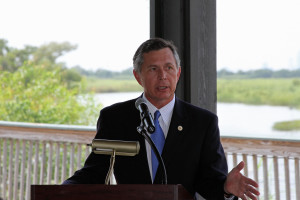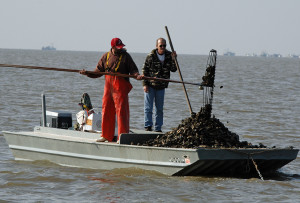Looming budget cuts threaten ADCNR services
The state budget impasse in the Legislature in Montgomery could soon have far-reaching impacts on those who love and enjoy the abundant natural resources Alabama has to offer.
Alabama Department of Conservation and Natural Resources Commissioner N. Gunter Guy Jr. and the directors of the four divisions – State Parks, Wildlife and Freshwater Fisheries, Marine Resources and State Lands – have taken that message across the state in the past week to highlight those impacts if proposed cuts to the DCNR budget become reality.
At the third stop on that tour at Spanish Fort’s 5 Rivers Delta Resource Center on Tuesday, Commissioner Guy implored the public to become involved in the process.
“We’re here today to get out a message,” Commissioner Guy said. “That message is we need your help. We have a looming budget crisis in Montgomery. Everybody knows about it, but it’s important we talk about it to our constituents, that if this is not solved, it not only will have a negative impact on our department, but it will have a negative impact on you, your family, your friends and your community.”

Commissioner Guy said most people don’t realize the Department of Conservation and Natural Resources does not get any money from the state’s General Fund. The DCNR’s budget comes from license sales, fees and federal funds, much of it from matching dollars from excise taxes paid by the public.
“We don’t get any General Fund money, but the Legislature has taken more than $27 million through administrative transfers in the last four years,” Commissioner Guy said. “We can no longer sustain these types of transfers. In the three budgets that have been proposed this year, they have proposed transfers from our agency of $5.4 million, $9.2 million, and in this last special session it was $18.3 million.”
Commissioner Guy said all the DCNR has requested from the Legislature is to be level-funded so no services or facilities will be adversely impacted.
“If our department is not level-funded, the consequences to our department, its employees and to the public will be devastating,” he said. “We can’t talk about exactly what will happen because we don’t know. Some examples, depending on the severity, would include the closure of parks and their services.
“With cuts of $18.3 million and that magnitude, we’re also talking about closures of (Wildlife Management Areas) and other Wildlife and Freshwater Fisheries operations; closures of Forever Wild operations and facilities; closures of Marine Resources Division operations and facilities on the coast; closures of lands and coastal programs; and loss of significant federal funding.”
Commissioner Guy said those kinds of cuts will have a ripple effect that will quickly reach the public.
“They won’t be buying groceries,” he said. “They won’t be buying gas. It’s part of the economic engine that we know our department represents. It’s probably more than $5 billion when you add all our four divisions, including many, many dollars in local and state taxes. When people in Montgomery talk about cutting government, it’s about cutting the public. It’s about cutting those services. It’s about cutting that income that people depend on that is part of what we are about. That’s the important message to everybody.”
Commissioner Guy asked the public to become involved and contact their legislators to support efforts to raise enough revenue to fully fund the government so essential services won’t be impacted.
“This is a problem we all face, and your voice does make a difference,” he said. “Lastly, I’ve heard people say, ‘This is just a scare tactic.’ Well, folks, it’s not a scare tactic for us. It affects real life and real people. It affects their families and communities.”
Another aspect of the looming cuts pointed out by Chuck Sykes, Wildlife and Freshwater Fisheries Director, is the effect on federal funds already distributed to WFF and Marine Resources. For every dollar in license sales, $3 in matching funds comes from Pittman-Robertson Act and Sport Fish Restoration money.

“If the Legislature takes $1 from either Marine Resources or Wildlife and Freshwater Fisheries, it puts us in diversion,” Sykes said. “That means we stand to have to send back $25 million to the U.S. Fish and Wildlife Service because we’ve violated the Pittman-Robertson Act and the Sportfish Restoration Act by using these dollars for something other than wildlife.
“And $1 is as good as $5 million. There’s an amendment to the Alabama Constitution, Amendment 272, that says nothing that goes into the Game and Fish Fund can be used for anything other than managing and protecting the wildlife resources of Alabama and paying for the administration of the department that does that. The problem I’m seeing is that is hunters’ and fishermen’s money. They have paid into the system. This is not General Fund money. So they are basically robbing the hunters and fishermen, period.”
Sykes said if WFF staff is furloughed, gates will be locked. WMAs will be closed. Law enforcement officers won’t be available to respond to poaching or trespassing complaints.
“God forbid we have a natural disaster, like the tornadoes that hit Tuscaloosa or the ice storm that shut down Birmingham a couple of years ago,” he said. “The first people they call are us because we have four-wheel drives and chain saws and know how to work outside. There are people out there who say, ‘That’s fine, shut the government down.’ They need to think long and hard about that. Just because they don’t hunt or fish or own land, our department impacts all 67 counties.
“Instead of being held up as an agency that is self-funded, managing its money properly, providing services for the citizens and being an example of something positive, they’re trying to steal from it. It doesn’t make sense to me.”
Patti Powell, Director of State Lands, said budget cuts could have an impact on efforts to get Alabama’s fair share of the settlement money from the Deepwater Horizon oil spill.
“We’re still competing with the other states on how that Deepwater Horizon money will be distributed,” Powell said. “If there is any indication that we won’t have the staff to properly implement that program, that alone could hurt us in getting that money.”
Dauphin Island Mayor Jeff Collier and Chris Nelson of Bon Secour Fisheries talked about the consequences on Alabama’s seafood production if Marine Resources can’t fulfill its roles that include boat ramp maintenance and seafood monitoring programs. Without MRD monitoring, oyster reefs would be closed to harvest.
Marine Resources Director Chris Blankenship said that the commercial and recreational fisheries on the Alabama Gulf Coast account for about 11,000 jobs and a $1.2 billion economic impact.
State Parks Director Greg Lein said DCNR has been very open over the last few months about the concerns over a lack of a budget.
“As a consequence, we felt it was incumbent on us to speak to the public and be very open and honest about what these concerns are and about our experiences over the past four years where we have experienced the transfer of funds from our agency, and also the last four months,” Lein said. “Transfers at any level will harm our agency’s programs. Transfers at the level that have been proposed will cause catastrophic harm to our agency’s programs, the services we provide to the public and the state’s economy.”
David Rainer is public information manager and outdoor columnist for the Alabama Department of Conservation and Natural Resources. His column appears weekly in The West Alabama Watchman.
